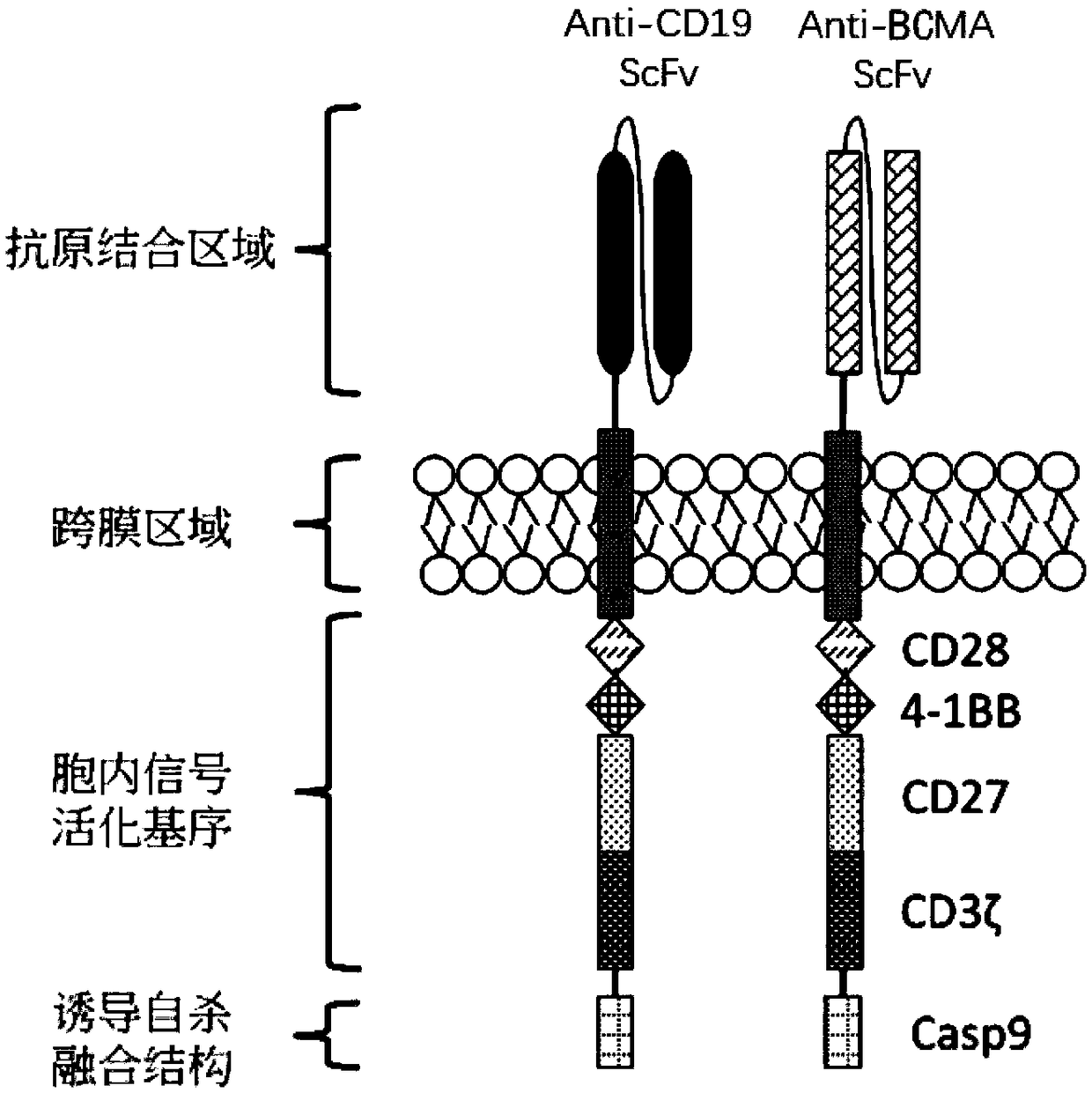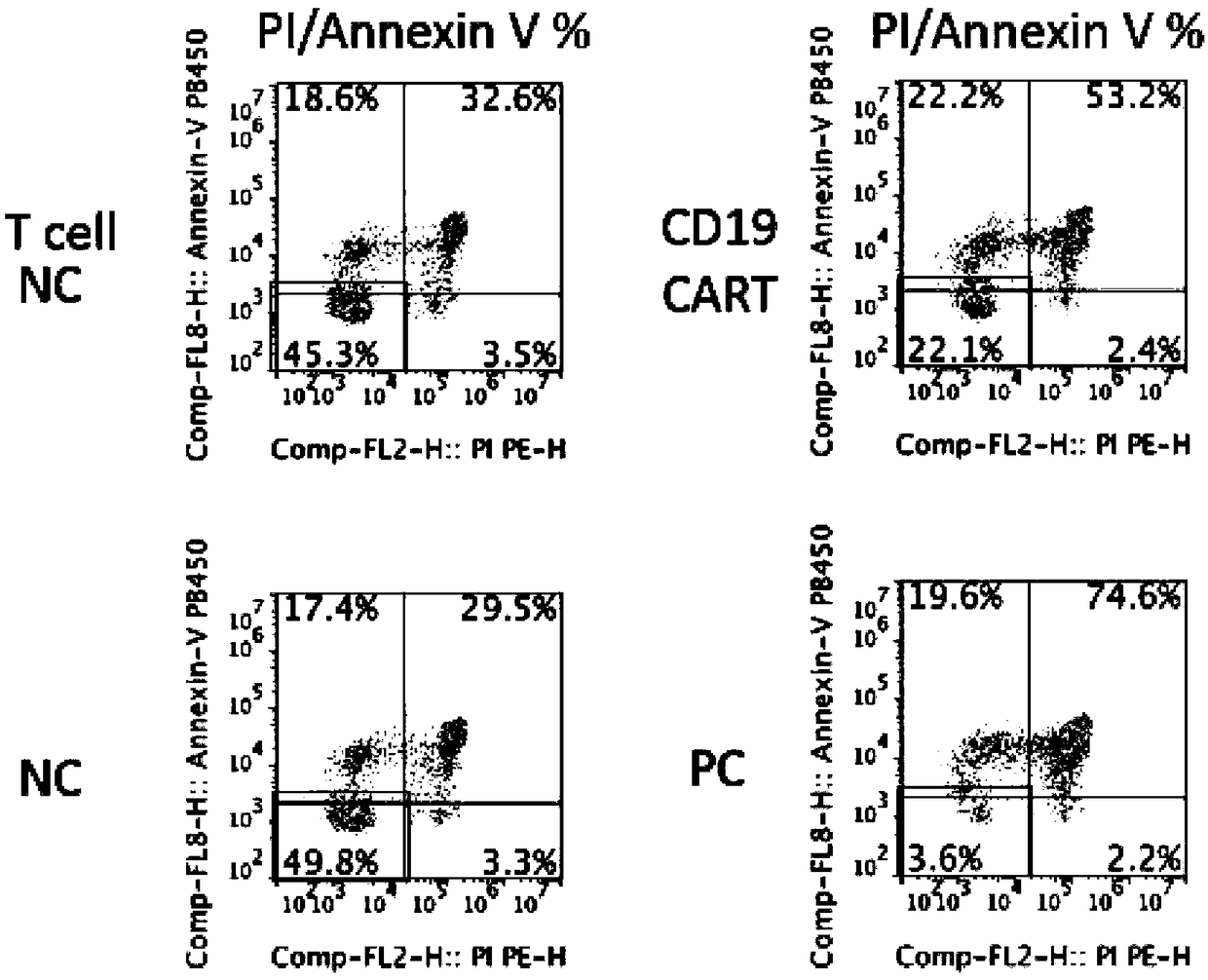Double chimeric antigen receptor gene-modified immune cell based on CD19 and BCMA and application thereof
A technology of chimeric antigen receptors and immune cells, applied to genetically modified cells, cells modified by introducing foreign genetic material, blood/immune system cells, etc., can solve the problems of unsatisfactory long-term effects and avoid escape , strong tumor effect, enhanced long-term immune effect
- Summary
- Abstract
- Description
- Claims
- Application Information
AI Technical Summary
Problems solved by technology
Method used
Image
Examples
Embodiment 1
[0075] Example 1 Construction of Chimeric Antigen Receptor
[0076] (1) Synthesize Secretory signal peptide, CD19 or BCMA antigen binding domain, CD8α and / or CD28 transmembrane domain, CD28 signaling domain, CD27 signaling domain, CD3ζ signaling domain, 2A sequence and Caspase 9 domains, such as figure 1 As shown, namely Secretory-CD19scFv-CD28-CD27-CD3ζ-2A-FBKP.Casp9 and Secretory-BCMA scFv-CD28-CD27-CD3ζ-2A-FBKP.Casp9; the specific sequences are as follows:
[0077] The nucleotide sequence of Secretory-CD19 scFv-CD28-CD27-CD3ζ-2A-FBKP.Casp9 is shown in SEQ ID NO.5.
[0078] The nucleotide sequence of Secretory-BCMA scFv-CD28-CD27-CD3ζ-2A-FBKP.Casp9 is shown in SEQ ID NO.7.
Embodiment 2
[0079] Example 2 lentiviral packaging
[0080] (1) Use 293T cells and culture for 17-18 hours;
[0081] (2) Add fresh DMEM containing 10% FBS;
[0082] (3) Add the following reagents to a sterile centrifuge tube: Take DMEM from each well, add helper DNA mix (pNHP, pHEF-VSV-G) and pTYF DNA vector, and vortex;
[0083] (4) Add Superfect or any transgenic material to the centrifuge tube, and let stand at room temperature for 7-10 minutes;
[0084] (5) Add the DNA-Superfect mixture in the centrifuge tube to each cultured cell drop by drop, and vortex to mix well;
[0085] (6) 37°C 3% CO 2 Cultivate in the incubator for 4-5 hours;
[0086] (7) Suck away the culture fluid of the culture medium, wash the culture medium with 293 cell culture fluid, and add the culture fluid to continue culturing;
[0087] (8) Return the culture medium to 3% CO 2 Culture overnight in an incubator, and observe the transfection efficiency with a fluorescence microscope the next morning.
Embodiment 3
[0088] Example 3 Purification and Concentration of Lentivirus
[0089] 1) Virus purification
[0090] Remove cell debris by centrifugation at 1000g for 5 minutes to obtain virus supernatant, filter the virus supernatant with a 0.45 micron low protein binding filter, divide the virus into aliquots, and store at -80°C;
[0091] Typically, transfected cells can produce 10 6 to 10 7 Lentiviral vectors for titration of transducing units.
[0092] 2) Concentrate the lentiviral vector with a Centricon or similar filter
[0093] (1) Add virus supernatant to Centricon or similar filter tube, then centrifuge at 2500g for 30 minutes;
[0094] (2) Shake the filter tube, then centrifuge at 400g for 2 minutes, and collect the concentrated virus into the collection cup. Finally, pool the virus in all tubes into one centrifuge tube.
PUM
 Login to View More
Login to View More Abstract
Description
Claims
Application Information
 Login to View More
Login to View More - R&D
- Intellectual Property
- Life Sciences
- Materials
- Tech Scout
- Unparalleled Data Quality
- Higher Quality Content
- 60% Fewer Hallucinations
Browse by: Latest US Patents, China's latest patents, Technical Efficacy Thesaurus, Application Domain, Technology Topic, Popular Technical Reports.
© 2025 PatSnap. All rights reserved.Legal|Privacy policy|Modern Slavery Act Transparency Statement|Sitemap|About US| Contact US: help@patsnap.com



